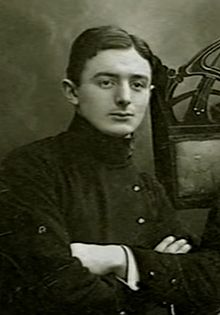Dziga Vertof
| Dziga Vertov | |
|---|---|

David Kaufman in 1913
|
|
| Born |
David Abelevich Kaufman 2 January 1896 Białystok, Grodno Governorate, Russian Empire (now Poland) |
| Died | 12 February 1954 (aged 58) Moscow, RSFSR, Soviet Union (now Russia) |
| Cause of death | Cancer |
| Nationality | Soviet |
| Occupation | Film director, cinema theorist |
| Years active | 1917-1954 |
| Notable work | Man with a Movie Camera |
| Spouse(s) | Elizaveta Svilova (1929-1954; his death) |
| Family |
Boris Kaufman (brother) Mikhail Kaufman (brother) |
Dziga Vertov (Russian: Дзига Вертов; born David Abelevich Kaufman, Russian: Дави́д А́белевич Ка́уфман, and also known as Denis Kaufman; 2 January 1896 – 12 February 1954) was a Soviet pioneer documentary film and newsreel director, as well as a cinema theorist. His filming practices and theories influenced the cinéma vérité style of documentary movie-making and the Dziga Vertov Group, a radical film-making cooperative which was active from 1968 to 1972.
In the 2012 Sight & Sound poll, critics voted Vertov's Man with a Movie Camera (1929) the 8th best film ever made.
Vertov's brothers Boris Kaufman and Mikhail Kaufman were also noted filmmakers, as was his wife, Elizaveta Svilova.
Vertov was born David Abelevich Kaufman (Russian: Дави́д А́белевич Ка́уфман) into a family of Jewish lineage in Białystok, Poland, then a part of the Russian Empire. He Russified his Jewish name David and patronymic Abelevich to Denis Arkadievich at some point after 1918. Vertov studied music at Białystok Conservatory until his family fled from the invading German Army to Moscow in 1915. The Kaufmans soon settled in Petrograd, where Vertov began writing poetry, science fiction and satire. In 1916-1917 Vertov was studying medicine at the Psychoneurological Institute in Saint Petersburg and experimenting with "sound collages" in his free time. He eventually adopted the name "Dziga Vertov", which translates loosely from Ukrainian as 'spinning top'.
...
Wikipedia
